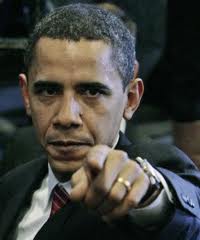
New Delhi, July 17: A day after US President Barack Obama's call for lifting of foreign investment curbs by India, the government on Monday shot back asking Washington not to meddle with the country's internal affairs and suggested that the world's largest economy should lead the fight against protectionism. The statement came amid protests from the Opposition, which asked the government not succumb to US pressure.
"He (Obama) has every right to convey what his perceptions are but the policymaking is a sovereign decision and India's FDI policy regime is investor-friendly," commerce and industry minister Anand Sharma said at a press conference while referring to various reports to argue that India remained one of the most attractive investment destinations.
"...by all indications it is the regime, the climate that we have created in India through various policy measures, reforms, simplification, rationalization. We have followed a calibrated approach in following the path of economic reforms," the minister said.
By evening the Prime Minister's Office too got into the act and pulled out a recent Unctad report to make the same points that Sharma had made earlier on Monday. "India is the third most desirable destination for Foreign Direct Investment (FDI)- UNCTAD World Investmnent (sic) Report 2012," the PMO tweeted. It then went on to say that China and India saw inflows rise 8% and 31%, respectively.
Interestingly, when the UNCTAD report was released earlier this month, it went largely unnoticed with only corporate affairs minister Veerappa Moily talking about it.
In an interview, Obama had said that that India prohibits foreign investment in too many sectors such as retail and endorsed another wave of economic reforms. "It is still too hard to invest in India. In too many sectors, such as retail, India limits or prohibits the foreign investment...which is necessary for India to continue to grow," he had said.
Interestingly, in contrast to government's angry retaliation, Congress came up with a stoic response, advising all "not to get hot under collar".
The BJP reacted strongly with former finance minister Yashwant Sinha describing it as irresponsible and said the country did not need his advice on the investment climate or FDI in multi-brand retail. "If we have a problem it will be sorted out among ourselves. As far as FDI in multi-brand retail is concerned, his advice is completely unsolicited. He has not strengthened the cause by making such remarks," he said.
On its part, CPM termed the US president's statement as "a brazen attempt" to pressurize the UPA government. Asking the government not to succumb to this "pressure", the CPI(M) politburo said the party "objects to the remarks made by Obama that India open the doors to Wal-Mart for retail trade and other American investments in India."
The government, which has been pushing for allowing retail chains to set up multi-brand stores in the country, did not comment on it but asked the US to focus on removing barriers to trade such as a hike in visa fees.
"We would rather urge the US to demonstrate leadership in bringing down barriers, encouraging capital flows and trade in the world which is good for every economy. The US should be leading the fight against protectionism and taking forward the stalled Doha Development Round of the WTO to a meaningful conclusion," Sharma added.
Congress said there was "no need to get hot under the collar" over Obama's remarks on "deteriorating" investment climate in India, contending that a mature democracy should take the observations in its stride and move on.
"I think the one thing the world understood in the past 62 years is that whatever decision India takes ...it takes in its own enlightened national interest," party spokesman Manish Tewari told reporters.
He said there was "no need to get hot under the collar" if certain statements are made by certain distinguished people or even if comments are made by certain newspapers and magazines.
"If at all there is any need to clarify, those clarifications have been given.....and I think as a matured democracy we should factor these observations in our stride and move on", Tewari added.






Comments
Add new comment